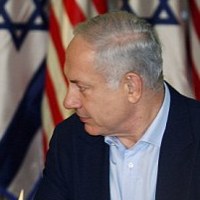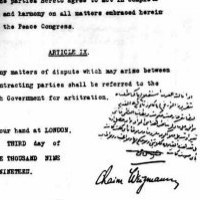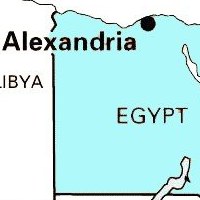Brussels, december 8, 2009: the Foreign Affairs Council of the European Union (under presidency of Minister of foreign affairs of Sweden, Mr. Carl Bildt) discussed the situation in the Middle East, and in particular the current impasse in the Peace Process. The Council adopted conclusions on the Middle East Peace Process. It called for the urgent resumption of negotiations that will lead, within an agreed time-frame, to a two-state solution with the State of Israel and an independant, democratic, contiguous and viable State of Palestine, living side by side in peace and security.
It recalled that the European Union would not recognise any changes to the pre-1967 borders including with regard to Jerusalem, other than those agreed by the parties.
Council conclusions on
the Middle East Peace Process
—
2985th FOREIGN AFFAIRS Council meeting
Brussels, 8 December 2009
The Council adopted the following conclusions:
1. The Council of the European Union is seriously concerned about the lack of progress in the Middle East peace process. The European Union calls for the urgent resumption of negotiations that will lead, within an agreed time-frame, to a two-state solution with the State
of Israel and an independent, democratic, contiguous and viable State of Palestine, living side by side in peace and security. A comprehensive peace, which is a fundamental interest of the parties in the region and the EU, must be achieved on the basis of the relevant UN Security Council Resolutions, the Madrid principles including land for peace, the Roadmap, the agreements previously reached by the parties and the Arab Peace Initiative.
2. The Council reconfirms its support for the United States’ efforts to resume negotiations on all final status issues, including borders, Jerusalem, refugees, security and water, respecting previous agreements and understandings. The European Union will not recognise any changes to the pre-1967 borders including with regard to Jerusalem, other than those agreed by the parties. The Council reiterates the EU’s readiness to contribute substantially to post-conflict arrangements, aimed at ensuring the sustainability of peace agreements, and will continue the work undertaken on EU contributions on state-building, regional issues, refugees, security and
Jerusalem. The Council underlines the need for a reinvigorated Quartet engagement and notes the crucial importance of an active Arab contribution building on the Arab Peace Initiative.
3. The EU stands ready to further develop its bilateral relations with the Palestinian Authority reflecting shared interests, including in the framework of the European Neighbourhood Policy. Recalling the Berlin declaration, the Council also reiterates its support for negotiations leading to Palestinian statehood, all efforts and steps to that end and its readiness, when appropriate, to recognise a Palestinian state. It will continue to assist Palestinian statebuilding, including through its CSDP missions and within the Quartet. The EU fully supports the implementation of the Palestinian Authority’s Government Plan “Palestine, Ending the Occupation, Establishing the State” as an important contribution to this end and will work for enhanced international support for this plan.
4. Recalling the EU’s position as expressed at the Association Council in June 2009, the Council reaffirms its readiness to further develop its bilateral relations with Israel within the framework of the ENP. The EU reiterates its commitment towards the security of Israel and its full integration into the region, which is best guaranteed through peace between Israel and its neighbours.
5. Encouraging further concrete confidence building measures, the Council takes positive note of the recent decision of the Government of Israel on a partial and temporary settlement freeze as a first step in the right direction and hopes that it will contribute towards a resumption of meaningful negotiations.
6. Developments on the ground play a crucial part in creating the context for successful negotiations. The Council reiterates that settlements, the separation barrier where built on occupied land, demolition of homes and evictions are illegal under international law, constitute an obstacle to peace and threaten to make a two-state solution impossible. The Council urges the government of Israel to immediately end all settlement activities, in East Jerusalem and the rest of the West Bank and including natural growth, and to dismantle all outposts erected since March 2001.
7. The EU welcomes Israel’s steps to ease restrictions of movement in the West Bank which have made a contribution to economic growth. The Council calls for further and sustained improvements of movement and access, noting that many check points and road blocks remain in place. The Council also calls on the Palestinian Authority to build on its efforts to improve law and order.
8. The Council is deeply concerned about the situation in East Jerusalem. In view of recent incidents, it calls on all parties to refrain from provocative actions. The Council recalls that it has never recognised the annexation of East Jerusalem. If there is to be a genuine peace, a way must be found through negotiations to resolve the status of Jerusalem as the future capital of two states. The Council calls for the reopening of Palestinian institutions in Jerusalem in accordance with the Roadmap. It also calls on the Israeli government to cease all discriminatory treatment of Palestinians in East Jerusalem.
9. Gravely concerned about the situation in Gaza, the Council urges the full implementation of UNSCR 1860 and the full respect of international humanitarian law. In this context, the continued policy of closure is unacceptable and politically counterproductive. It has devastated the private sector economy and damaged the natural environment, notably water and other natural resources. The EU again reiterates its calls for an immediate, sustained and unconditional opening of crossings for the flow of humanitarian aid, commercial goods and persons to and from Gaza. In this context, the Council calls for the full implementation of the Agreement on Movement and Access. While extremists stand to gain from the current situation, the civilian population, half of which are under the age of 18, suffers. Fully recognising Israel’s legitimate security needs, the Council continues to call for a complete stop to all violence and arms smuggling into Gaza. The Council calls on those holding the abducted Israeli soldier Gilad Shalit to release him without delay.
10. The Council calls on all Palestinians to promote reconciliation behind President Mahmoud Abbas, support for the mediation efforts by Egypt and the Arab League and the prevention of a permanent division between the West Bank, including East Jerusalem, and Gaza. The Council would welcome the organisation of free and fair Palestinian elections when conditions permit.
11. A comprehensive peace must include a settlement between Israel and Syria and Israel and Lebanon. Concerning the Syrian track, the EU welcomes recent statements by Israel and Syria confirming their willingness to advance towards peace and supports all efforts aimed at the reactivation of the talks between the two countries.
12. The EU recalls that a comprehensive settlement of the Arab-Israeli conflict requires a regional approach and will continue its work on this in line with the June 2009 Council Conclusions using all its instruments to this effect. The EU also calls on all regional actors to take confidence building measures in order to stimulate mutual trust and encourages Arab countries to be forthcoming, both politically and financially, in assisting the Palestinian Authority and to Palestinian refugees through UNRWA.
—
Source: Counsel conclusions on the Middle East Peace Process.
Mazzeltov,
Crethi Plethi



 RSS
RSS











RT @CrethiPlethi: European Union: Jerusalem capital of two states http://bit.ly/8rNg0V #israel
European Union: Jerusalem capital of two states http://bit.ly/8rNg0V #israel
RT @CrethiPlethi: European Union: Jerusalem capital of two states http://bit.ly/8rNg0V #israel
RT @CrethiPlethi: European Union: Jerusalem capital of two states http://bit.ly/8rNg0V #israel